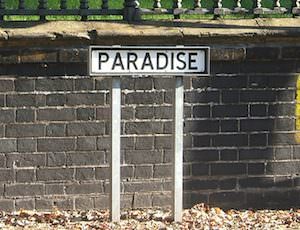America’s Reckless War Against Evil
After the attacks in Paris, Barack Obama called Islamic State “the face of evil.” The “evildoers” are back. And from every mountaintop, it seems, America rings with calls to ramp up its war machine. Kevin Dooley / CC BY 2.0
1
2
3
Kevin Dooley / CC BY 2.0
1
2
3
Remember, to understand is not to justify. Quite the opposite, understanding often opens up ways of thinking more constructively and creatively about how to respond to such a challenge. It’s clear that Islamic State strategists understand American and European political cultures well indeed and, as they’ve repeatedly shown, they use that understanding to their grim advantage. They know just how to provoke us into anti-Muslim rhetoric and belligerent policies, which they find most useful to their project and their movement. Like classic judo warriors, they employ our immense strength remarkably effectively against us.
Every one of Washington’s words and acts of war, every ally like Great Britain that joins the bombing campaign against IS, only confirms the Islamic State’s message that Muslims are under attack by the West. All of it only plays into the IS’s own apocalyptic worldview. Every step in the process makes the IS more attractive to Muslims who feel oppressed and marginalized by the West. So think of every threat uttered in the presidential campaign here and every bomb now being dropped as yet more global recruitment posters arriving “like manna from heaven” for that movement. Each is an invitation to launch yet more Paris-style attacks.
Our blindness to them as human beings, and to all the ways we have influenced them, increases their power and undermines our power to shape the outcome of events in Iraq, Syria, and elsewhere in the Greater Middle East. Ironically, we accept this loss of power willingly, even eagerly, because it allows us to hold on to what seems to matter most to us: our vision of a war against inhuman evildoers, which brings us to…
Mistake Number Five: To convince ourselves that the Islamic State is evil incarnate, we imagine that the enemy is as relentless, intractable, and implacable as the devil himself. As a result, we also imagine that nothing we could do might diminish their will to evil. Since, as we see it, we had nothing to do with creating these monsters, no changes in our policies or actions could possibly influence their behavior. And since they are just crazy — not capable of normal rationality — there is no point in trying to talk with them.
By this route we finally, inevitably, arrive at…
Mistake Number Six: The belief that we have only one option: annihilation. Or if that proves impossible, despite the military forces at our disposal, then at least containing them forever.
In fact, the presidential candidates of this moment all demand annihilation and nothing less. In Donald Trump’s words, “bomb the shit out of ‘em.” In Hillary Clinton’s more demure formulation, “crush ISIS… break the group’s momentum and then its back.” Even Bernie Sanders agrees: “Our priority must be… to destroy the brutal and barbaric ISIS regime.”
The dream of a war of annihilation against evil has a long, long history in white America. It began in 1636 when Puritans in New England wiped out the Pequot tribe, promising that such a lesson would prevent further attacks by other tribes. In fact, it created a spiral of violence and counter-violence, and a war-against-evil template that the country still follows nearly four centuries later in its “war on terror.” The current conflict in Iraq and Syria seems only to be locking us into that template and its guaranteed cycle of violence ever more firmly.
Why do we as a nation keep on playing into the same dismal scenario and committing the same mistakes? Why this seemingly irresistible urge to fight yet another war against evil?
I worry that the answer to such questions may lie in what I’ve called an American myth of national insecurity. It tells us that we will always be at war with evildoers bent on destroying us; that this war (whichever the latest one may be) is the mission and the meaning of our nation; and that the only way to feel like a real American is to enlist permanently in permanent war.
In other words, even as we stoke the Islamic State, we stoke ourselves as well. The longer we fight, the more deeply we are seized by fear. The more we fear, the more fiercely we are determined to fight. Perhaps the point is not to win the war but to remain trapped in this vicious circle, which feels perversely comforting because it offers a sense of unified national identity as nothing else can in our otherwise deeply divided nation.
National myths are, however, invented by human beings, and we are always capable of changing our minds. Who knows? Maybe someday the Islamic State will figure out that brutal killing and other acts of horror in the name of the caliphate are not such a good idea after all. And maybe the United States will figure out that depending on an eternal, self-defeating war against evil for our national identity is a huge mistake after all. Maybe.
Ira Chernus, a TomDispatch regular, is professor of religious studies at the University of Colorado Boulder and author of the online “MythicAmerica: Essays.” He blogs at MythicAmerica.us.
Follow TomDispatch on Twitter and join us on Facebook. Check out the newest Dispatch Book, Nick Turse’s Tomorrow’s Battlefield: U.S. Proxy Wars and Secret Ops in Africa, and Tom Engelhardt’s latest book, Shadow Government: Surveillance, Secret Wars, and a Global Security State in a Single-Superpower World.
Copyright 2015 Ira Chernus
Your support matters…Independent journalism is under threat and overshadowed by heavily funded mainstream media.
You can help level the playing field. Become a member.
Your tax-deductible contribution keeps us digging beneath the headlines to give you thought-provoking, investigative reporting and analysis that unearths what's really happening- without compromise.
Give today to support our courageous, independent journalists.







You need to be a supporter to comment.
There are currently no responses to this article.
Be the first to respond.